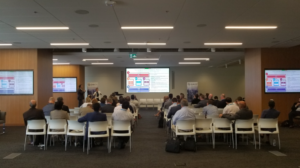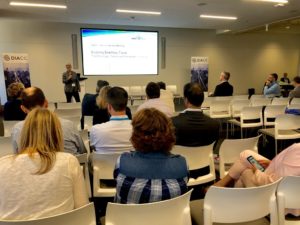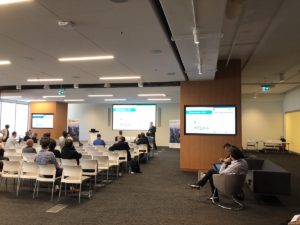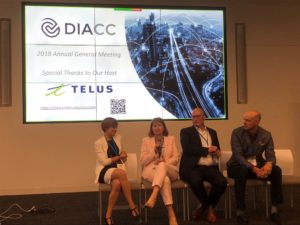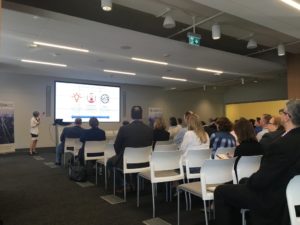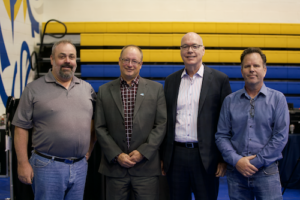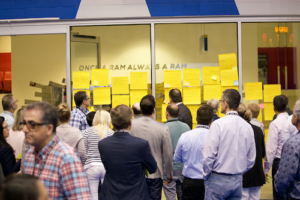DIACC member PlaceSpeak recently published a new white paper, “Civic Networks: The Future of Community Engagement” outlining the shortcomings of global social networks and the huge potential of place-based networks rooted in verifiable digital identity. We connected with their team to find out how PlaceSpeak is using digital identity solutions to transform community action and how people connect, contribute, and relate online.
DIACC: Tell us a bit about PlaceSpeak and the “Civic Networks: The Future of Community Engagement” white paper.
PlaceSpeak: Our new white paper outlines some of the recent challenges with social networks which have been brought more sharply into public view, such as the Cambridge Analytica revelations. Governments and politicians have relied heavily on social media to reach and engage with citizens. However, it is now apparent that social media is inadequate for genuine online civic participation – bots, trolls and astroturfing undermine digital democracy and there is no way to tell whether comments on social media genuinely come from a community member, or from bots run by special interest or lobby groups. Furthermore, advertising-based models incentivize social media platforms to reinforce users’ existing paradigms by showing them content that they are more likely to engage with. It’s clear that a new paradigm is required. 
As opposed to social networks, civic networks are tied to place-based communities, such as streets, neighbourhoods, schools, stratas/homeowner associations and more. PlaceSpeak has been developing one such civic network that is not based on advertising or the data mining of users. It authenticates users to place, ensuring that they are real people – not bots. We believe that this is the future of online community engagement: hyperlocal and privacy-protecting, with the capacity to support respectful and authentic dialogue on wicked community issues, by design.
DIACC: How is does PlaceSpeak take a unique approach to reframing control over personal information and activating local communities?
PlaceSpeak: People are becoming increasingly cognizant of the fact that their personal information and data is being mismanaged by social media platforms. Terms and Conditions/Privacy Policies are usually opaque and difficult even for tech-savvy users to understand.
As a Privacy by Design (PbD) ambassador, protecting the privacy of users is of utmost importance at PlaceSpeak. PbD principles ensure that privacy measures are architected into the very structure of the platform. Instead of responding to a privacy breach, PbD works proactively to ensure that such circumstances do not happen in the first place. PbD assumes that privacy is the default. User information is kept private and never shared with third-party individuals or organizations – users have to agree to make their information public.

The assurance of privacy protection is crucial for building trust in the digital identity authentication process – thus creating a safe, secure environment where people can be confident that they are engaging with other real people in their communities.
DIACC: The white paper opens with a strong analysis of the shortcomings of social media for civic engagement, and points to the business models of behemoth platforms like Facebook and Twitter as a core issue. What alternatives are there? How might digital identity support the creation of new business models?
PlaceSpeak: The issues which have emerged in recent months in platforms such as Facebook and Twitter stem fundamentally from their business model, which exploits the personal information of users to advertise to them. For example, Facebook’s pay-per-click model (PPC) charges, on average, between $0.20 – $0.80 USD when a user clicks on a link. Advertising-based models are incentivized to show users content which aligns with their pre-existing viewpoints, which they are more likely to click on and engage with.
Civic networks, such as PlaceSpeak, must be 1) authentic, 2) privacy-protecting, and 3) not funded by advertising. Digital identity authentication ensures that people are who they say they are online – not bots or hackers pretending to be community members. This, in combination with the protection of the personal information and data of users, is critical to building trust. Finally, any platform that relies on advertising prioritizes those who are able to pay to get the word out. Genuine civic engagement can only truly occur when everyone can have their voice heard – not only industry or lobby groups which can afford to pay to amplify their message.
DIACC: How does digital identity support a shift from treating users as commodities to empowering them as citizens?
PlaceSpeak: Identity authentication is very self-explanatory during in-person forms of engaging with government. You have to prove that you are who you say you are before voting or accessing government services (e.g. applying for a driver’s licence, applying for Employment Insurance, filing your taxes, etc.)

So much of the online world thus far has been anonymous or pseudonymous that people have come to take that for granted. However, how can people access government services or genuinely engage with government online if there is no way of ensuring that they are the correct person? Digital identity authentication is therefore crucial for empowering users as citizens, as they move towards the full range of ways that they can engage with their governments online, whether that’s filing taxes, signing a petition or participating in a public consultation.
DIACC: How do you balance the need and desire for open data and transparency with privacy and security?
PlaceSpeak: Open data and transparency is crucial for building trust and empowering citizens to hold decision-makers accountable for outcomes which affect them and their communities. However, it must work hand-in-hand with privacy and security.
In PlaceSpeak’s case, the balance between transparency and privacy means that all aspects of a public consultation (e.g. background information, real-time results such as poll results and discussion forum comments) are publicly viewable by anyone, but the personal information that is used to authenticate participants is disaggregated from the results.
The participants’ private information (e.g. email address, physical address) is never sold, transferred, or otherwise shared with any third party, not even the organization conducting the consultation.
This is just one simple way in which transparency and privacy can work together to build trust and support robust systems for ongoing citizen engagement. In other cases such as open data, this includes aggregating and anonymizing the data that is released so that individual identifiable information cannot be publicly accessed.

DIACC: What key benefits of civic networks and/or community engagement strategies extend to different types of multi-stakeholder communities?
PlaceSpeak: The main benefit of civic networks is the breaking down of silos. It’s currently hard to be civically engaged even if you genuinely want to do so – people are busy with many other priorities. In the 2017 Vancouver Foundation report, 51% of respondents said that they didn’t have enough time to get involved. People currently have to subscribe to multiple sites if they want to stay informed and engaged, whether that’s their city’s email list, their child’s school, their neighbourhood association, utilities (hydro, telcos), etc.
Civic networks such as PlaceSpeak provide a one-stop “hub”: by signing up once, they can be kept notified of updates or proposed changes from all these different organizations. Instead of having to go out and hunt for information about a proposed rezoning, potential roadworks, or a scheduled hydro outage, all this information is delivered directly to users’ inboxes. They can also participate in consultations and provide feedback to all these different organizations from one single platform, and engage with others in their community.
DIACC: The paper notes that Facebook deleted 583 million fake accounts – more than a quarter of its monthly active users in early 2018. Yet, few people connect cyberbullying and bots to digital identity. Can you explain the connection?
PlaceSpeak: People behave terribly online when they’re anonymous. We can chalk this up to two factors: deindividuation and dehumanization. Deindividuation refers to the reduced sense of self-awareness and loss of personal responsibility which happens in anonymous contexts. People feel empowered to act and say things that they never would in a face-to-face interaction. Anonymity also dehumanizes the person on the receiving end of cyberbullying: it’s easy to forget that there is a real, live person behind that screen name. In today’s world, that may not be far from the truth – for example, 5-15% of Twitter users could be bots.
Digital identity is one way to hold people accountable for their online behaviour. We have found that even in extremely controversial discussions such as immigration or gun control, people participate respectfully when they have been authenticated.
Moreover, in the context of a civic network, when people know that they’re interacting with someone in their community – someone they could conceivably run into at the grocery store or while picking up their kid from school – they’re more likely to behave appropriately.

DIACC: The benefits of civic networks are outlined for the benefit of informed and involved citizens in a public sector context. How can civic networks empower the private sector?
PlaceSpeak: Within a public sector context there are many obvious applications: once an individual has been authenticated, they can be kept informed and notified of new opportunities to engage on an ongoing basis, whether that’s from their local government, the school district, the local transportation authority, etc.
However, civic networks such as PlaceSpeak have the potential to break down silos between different types of organizations, not only within the public sector. Many private sector projects must go through a permitting or assessment process, which may require public feedback or a duty to consult (e.g. First Nations). There are many potential applications for property developers, the resource industry, telecommunications, etc. to notify and gather defensible feedback from residents within the affected area of a proposed project.
Digital identity opens new possibilities across sectors. Learn more about PlaceSpeak solutions and become a DIACC member to collaborate with more leaders in digital identity and authentication.





 documents and move into
documents and move into 




